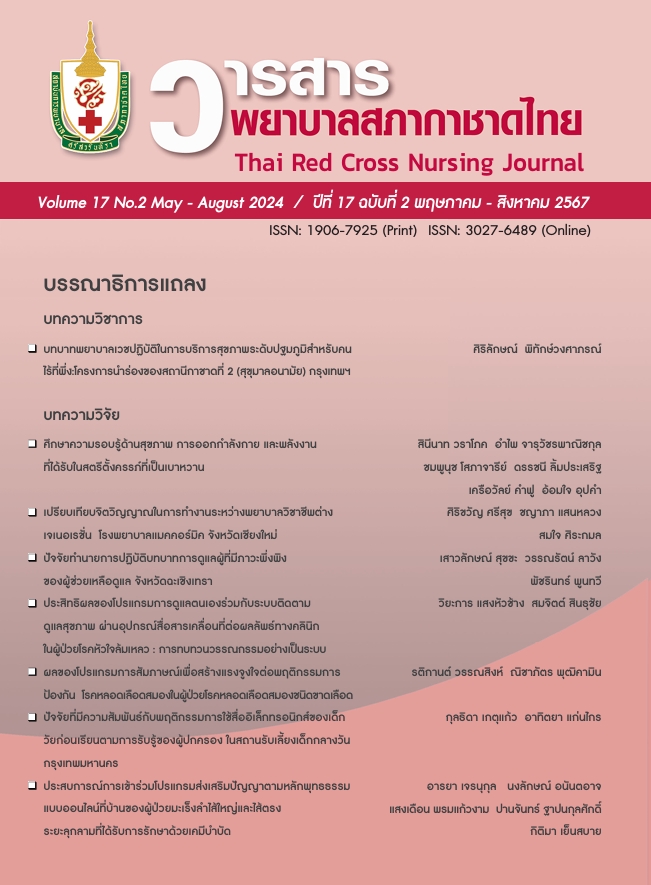The Experiences of Participating in an Online Buddhist Doctrine-Based Wisdom Enhancement Program at Home for Patients with Advanced Colorectal Cancer Undergoing Chemotherapy
Keywords:
experiences, buddhist doctrine-based wisdom enhancement program, online, patients with advanced colorectal cancer, chemotherapyAbstract
Patients undergoing chemotherapy for advanced colorectal cancer usually suffer from illness during treatment. Utilizing an online Buddhist doctrine-based wisdom enhancement program is one method of enhancing awareness of suffering and improving well-being.
This interpretative phenomenological qualitative study aims to describe the experiences of advanced colorectal cancer patients undergoing chemotherapy who participated in an online Buddhist doctrine-based wisdom enhancement program at home. Eleven key informants were selected via purposive sampling for the study. Data were collected using individual in-depth interviews and observations, and were analyzed using content analysis. The trustworthiness of the data was ensured using Lincoln and Guba’s criteria.
The research identified three main themes. The first theme was experience in Vipassana meditation practice, in which the participants had specific goals, learned mindfulness, discovered the process of meditation, practicing with a middle path approach, and faced health conditions as obstacles. The second theme was the online program, as participants found the program convenient and valued the mentorship. The third theme was the effects of Vipassana meditation practice, which involved patients gaining an understanding of the way of life, having living guidance, and experienced holistic health.
The online home-based Vipassana meditation practice could enhance the well-being of advanced colorectal cancer patients undergoing chemotherapy. The study findings could serve as fundamental information for using an online Vipassana meditation program to improve the well-being of other cancer patients.
References
National Cancer Institute. Hospital-based Cancer Registry 2022 [Internet]. Bangkok: Medical Record and Databased Cancer Unit, Medical Digital Division National Cancer Institute; 2021 [cited 2024 Mar 3]. Available from: https://www.nci.go.th/th/cancer_record/download/HOSPITAL-BASED_2021.pdf (in Thai)
World Health Organization. Palliative Care. Cancer control: knowledge into actio: WHO guide for effective programs; module 5 [Internet]. 2007 [cited 2024 Mar 3]. Available from: http://www.who.int/cancer/media/FINAL-Palliative
Lerdpanit P, Pakdevong N, Namvongprom A. Symptom experiences and quality of life of patients with advanced cancer receiving chemotherapy. APHEIT Journal Science & Technology. 2017;6(8):45-55. (in Thai).
Drury A, Payne S, Brady AM. Prevalence vs impact: A mixed methods study of survivorship issues in colorectal cancer. Qual Life Res 2022;31(4):1117-34.
Tipseankhum N, Tongprateep T, Forrester DA, Silpasuwun P. Experiences of people with advanced cancer in home-based palliative Care. Pacific Rim Int J Nurs Res 2016;20(3):238-51.
Chandrangarm S. Religious study. Bangkok: Thaiwattanapanich; 1991. (in Thai)
Pothiban L, Jeranukul A. A pilot study: situational analysis of end of life care for older Person in community. Journal of Gerontology and Geriatric Medicine 2013;14(2):61-71. (in Thai).
Bourchum U. Effect of supporting Buddhist doctrine practices on spiritual well-being among the elders with gynecological cancer [thesis]. Chiang Mai: Chiang Mai University; 2014. (in Thai)
Jeranukul A, Pothiban P, Chintanawat R, Seangthong S. Enhancing wisdom: a randomized controlled trial of a Buddhist program for people terminally ill with cancer. Pacific Rim Int J Nurs Res 2015;19(3):202-17.
kici Ç, Garip G, Gordon WV. The lived experiences of experienced Vipassana Mahasi Meditators: An interpretative phenomenological analysis. Mindfulness 2020;11(1):140-52.
Singhal K, Sriram S. The experiences of attending vipassana meditation retreat: a qualitative study. IAPS J Pract Ment Health 2023;1(1):13-26. doi: 10.4103/IJPMH.IJPMH_7_23
Arpanantikul M. Phenomenology: an application in nursing research. Bangkok: Ramathibodi Academic Textbook, Faculty of Medicine Ramathibodi Hospital, Mahidol University; 2020.
Holloway I, Galvin K. Qualitative research in nursing and healthcare. 4th ed. Chichester, West Sussex: John Wiley & Sons; 2017.
Diekelmann N, Allen D. A hermeneutic analysis of the NLN’s criteria for the appraisal of the Baccalaureate Programs. In: Diekelmann N, Allen D, Tanner C, editor. The NLN criteria for appraial of bacalaureate programs: a crtical hermeneutic analysis. New York: National League for Nursing; 1989. p. 11-34.
Lincoln YS, Guba EG. Naturalistic inquiry. Newbury Park (CA): SAGE; 1985.
Muksiritipanun B, Pongsathonviboon K, Soowit B, Jensuwan A, Wongrostrai Y. Spiritual well-being and needs among patients with end-stage renal disease, Faculty of Medicine Vajira Hospital, Navamindradhiraj University. Songklanagarind Journal of Nursing 2018; 38(1):63-76. (in Thai)
Payutto PA. Buddhadhamma. 55th ed. Bangkok: Dhamma Council; 2023. (in Thai)
Garland E, Gaylord S, Park J. The role of mindfulness in positive reappraisal. Explore (NY) 2009;5(1):37-44. doi: 10.1016/j.explore.2008.10.001.
Payutto PA. Dictionary of Buddism 43rd ed. [Internet]. 2021 [cited 2024 Mar 15].Available from: https://www.watnyanaves.net/uploads/File/books/pdf/dictionary_of_buddhism_pra-muan-dhaama.pdf. (in Thai)
Xunlin N, Lau Y, Klainin-Yobas P, Xunlin NG. The effectiveness of mindfulness-based interventions among cancer patients and survivors a systematic review and meta-analysis. Support Care Cancer 2020;28(4):1563–78. doi: 10.1007/s00520-019-05219-9
Osin NE, Turilina II. Mindfulness meditation experiences of novice practitioners in an online intervention: Trajectories, predictors, and challenges. Appl Psychol Health Well Being 2022;14(1):101-121. doi: 10.1111/aphw.12293. Epub 2021 Jul 15.
Puangmali N, Suwan S, Nontapa R. The four focuses insight meditation practice for human resource developmen. Veridian E-Journal, Silpakorn University 2018;11(1):1558-1604. (in Thai)
Thanayotsophon S. The effectiveness of vipassana meditation on changing life of practitioners in mind development for father: Preoject at wat Pacharoenrat, Pathum Thani Province [thesis]. Dhonburi Rajabhat University; 2015. (in Thai)
Suwan N, Kantawang S, Lirtmunlikaporn S. Concept analysis of spirituality. Rama Nurs J 2018;24(1):1-12. (in Thai)
Tainchaiyapurk P, Phrammaha Boonrod Mahaweero (Suebduang), Montri T. Vipassana practice according to Satipatthana 4 path to escape suffering. Journal of MCU Buddhapanya Review 2021;6(3):226-35 (in Thai)
Tosawas P. The disease treatment with a meditation method. Journal of Philosolphical Vision 2019;24(2):1-17. (in Thai)
Rusch HL, Rosario M, Levison LM, Olivera A, Livingston WS, Wu T, Gill JM. The effect of mindfulness meditation on sleep quality: a systematic review and meta-analysis of randomized controlled trials. Ann N Y Acad Sci 2019;1445(1):5-16. doi: 10.1111/nyas.13996.
Downloads
Published
Issue
Section
License
Copyright (c) 2024 Srisavarindhira Thai Red Cross Institute of Nursing

This work is licensed under a Creative Commons Attribution-NonCommercial-NoDerivatives 4.0 International License.
เนื้อหาบทความหรือข้อคิดเห็นต่างๆ ในวารสารพยาบาลสภากาชาดไทยนี้ เป็นความคิดเห็นของผู้เขียนบทความ ไม่ใช่ความเห็นของกองบรรณาธิการ หรือสถาบันการพยาบาลศรีสวรินทิรา สภากาชาดไทย






